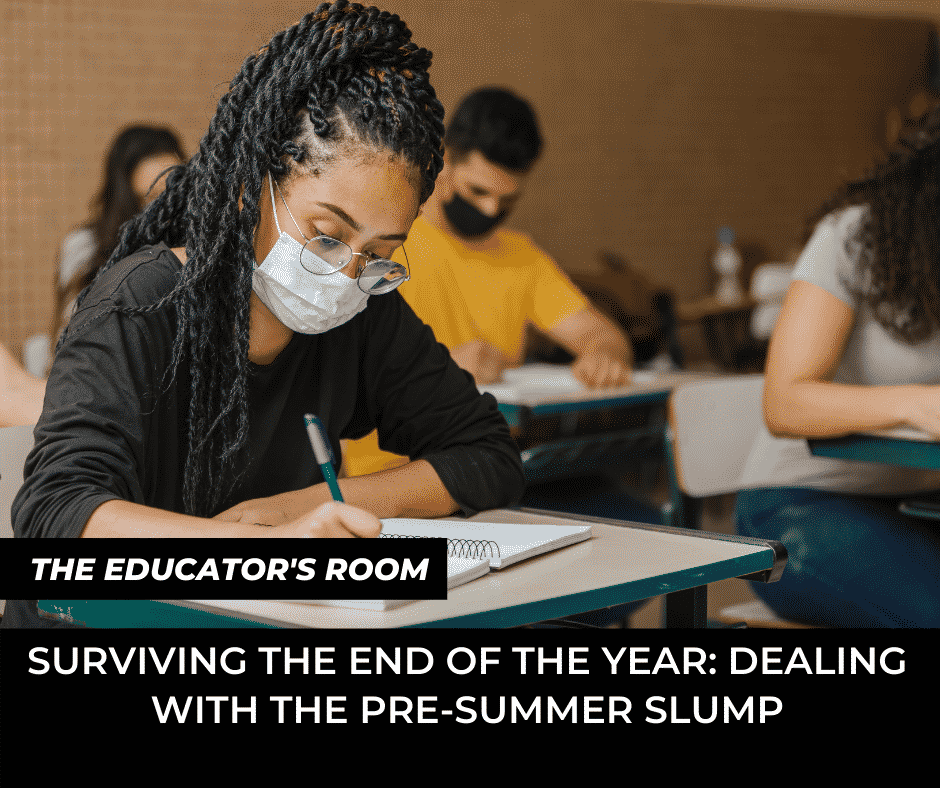I recently went on a local Instagram page and saw a post that commented on how long the last months of school are. When I saw it, I stopped scrolling for almost 10 minutes, re-reading the words, which led me to reflect on my journey this past month.
May was a trek, but this year it’s been even worse than usual. I have been teaching online since April after Ontario transitioned again to online learning. At first, it was a re-adjustment to being online after being in the classroom for a couple of months. However, it’s safe to say that the students, although disappointed, were mostly motivated at first. They were signing onto Zoom each day, participating in online discussions, leaving their cameras on (it’s not a requirement for my classes, but many of them still did it), submitting assignments mostly on time, asking questions about class materials, and engaging with each other.
Furthermore, my own motivation was quite high. I felt energized waking up, I was on top of planning my lessons, I was grading my assignments in record time, and I was keeping up with my work overall. However, May arrived, and it felt like the trek suddenly got worse. The climb to the end of the school year has become more arduous as we got further and further in May. I teach mostly Grade 11 and 12 students, and their motivation has dipped tremendously. With the weather getting warmer and the days getting sunnier, students are turning their cameras on less, showing up to class late (or missing classes completely), submitting assignments late, asking for many extensions (which is okay!). They have expressed how stressed, tired, and over it, they feel about the school year. We’ve even been discussing at school, amongst teachers and administrators, how to get students to the finish line when many of them struggle with their mental health during this time. I think all teachers typically feel their energy spreading thin as we get closer to the end of the school year. Still, with the pandemic, and the lockdowns, this tumultuous school year has taken a greater toll on us, especially the students.
Doug Ford, the Premier of Ontario, will be making a decision regarding the reopening of schools for a final couple of weeks of the semester, and regardless of the decision he makes, we (as educators) will need to develop strategies to help students and ourselves get through the last stretch of the year. So, for me, I’ve already thought of some aspects of the last couple of weeks that I will need to pay attention to and address to support myself and my students:
- Flexibility: I teach mostly English courses, and so it’s easier for me to assess my students using projects rather than exams. I personally feel like exams would be extremely difficult for students to focus on right now, and they feel very stressed, so a project (with a creative component) may be a better alternative. I’ve also decided that we will use the last 2 weeks of the semester to complete these final projects, and these 2 weeks will have regular check-ins built into them. I think giving them this much time will allow them to pace themselves, and they’ll also be able to take breaks. In terms of being flexible for myself, I will also be using this time to catch up on any work, and it will allow me to grade assignments in stages, as I have staggered class deadlines so that I won’t get a chunk of assignments all at the same time.
- Mental Health Check-ins: I’ve mostly been informally checking in with my students about how they’re feeling, about their plans for the summer, about their weekends, etc. I have had work periods where I would allow students to do work or read independently so that they wouldn’t have to be glued to the computer for hours. However, I wish I did more formal mental health check-ins or structured in-class guided meditations, yoga sessions, etc., to better support them mentally, especially during May. So, ensure to set aside time to have those mental health discussions or activities with your students (whether one-on-one or in a large group). However, don’t forget yourself! I have also been engaging in more intentional mental health check-ins with myself and nourishing my mind with things that bring me peace, i.e., Netflix, my dog & partner, reading, etc. As you provide the space for supporting your students mentally, make sure that you’re also considering your own mental health.
- Finding balance: I think this is key to making it through to the end of school. This time usually wears me down because I expend so much energy on messaging parents, chasing students for work, finishing the curriculum, creating exams, etc. Students are usually the least motivated during this time, and so it’s always an uphill battle. However, this year, I have to approach this time of this year with grace. I need to give myself grace and allow for more balance. That means stopping working at a certain time each day to honor my personal time while giving myself a day to complete my to-do list.
It’s safe to say that the 2020-2021 school year has been difficult for us all. We have navigated an almost impossible situation. Our students, who have had limited mental health support from their school districts, have been left feeling mentally exhausted and distressed, exacerbated by spending months indoors and having to learn through a computer. With these added factors, the month of May has felt more tiresome. If you’ve felt the weight of the end of the year even more so this year and haven’t been able to pinpoint why, take some time to reflect on what the past month has looked like for you, and consider some of the points above to help you maneuver these last weeks. Cheers, and all the best.






